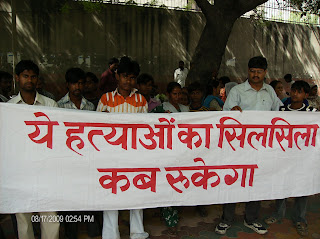Date: 30.06.09
Place: Pardarshita, F-185, New seema Puri, Delhi-95
Resource person: Mrs. Saraswati
On 30.06.09 we organized career counseling for the youth of Seema puri. Counseling is started with the introduction of youth with the recourse person, In which every member of the youth told about himself/herself i.e. about name, class school name, hobbies, courses they want to do, etc. after that the resource person Mr. Sarswati Nayar introduce herself with the youth group. She also told that she doing social work from last many years.
After that she starts counseling with the student who enter in the tenth class and the student who clear tenth class. She told that the student of tenth class can do the following courses:
After that she completely gave a speech on these topics then she told the students who are interested in math, those students can take commerce..
After that she told that the students who take science can choose medical line, student that take commerce can choose CA line, and the student who choose arts have many line e.g. Govt. jobs, political party etc. Then the students asked many questions from Resource person and she reply very smoothly to students.
Then she starts counseling with the 12th class students.
She explain the three steams fully- Engineering, Commerce and Medical
Then the resource persons inform that after 12th you all can enter in the collage according to the choice of your course.
Even you all can do these courses from the private collage.
B.P.P:- Bachelors Preparatory Programme
Then she briefly told about this course, she told that the student who is failed in 10th, and the 11th, 12th student can also do this course,
This course is done from IGNOU and the age limit of this course is above 17.
Fees structure: Rs. 2000.
Duration: 2Years
She also told that this course is equal to 12 pass.
IGNOU: - Indra Gandhi National Open University
Indra Gandhi National Open University can start lots of courses. Center of the IGNOU is open in all states of India.It also start vocational courses i.e. moter viding, book viding, radio and TV, Plumbing etc. along with all other courses are running i.e. B.A, M.A, PhD etc. IGNOU can also send for the training for many courses i.e. BSW, MSW, B.ed etc. The fee structure of all couses is different i.e. starting from 800 to 25000. And the exam of these courses is held in June and December.
AFMC:- Air Force Medical Collage
The student can be eligible in this course after 12th. This course can be done after clearance of entrance test.
Vocational Courses: -
These courses can be done with the continue of 8th, 9th, 11th, and 12th.these courses can be applicable for girls and boys, the fee structure of the courses are different. These courses art promoted by, Ngo’s, private institute and collages.
• Steno
• Typing
• Beautician
• Airhostess
• Modeling
• Photography
• Nursing
Courses Related to Agriculture:
• Dairy Technology
• Portly Technology
• Rural Management
Courses related to Mass Communication:
• Advertising
• Film Making
• Public Relation
• Journalism
Courses Related to computer and IT (information Technology)
• Animation (cartoons)
• Call center training
• Web designing
• Web Developer
• Out Recourses
For the entire above course English is must and the fee structure of these courses is near about 1 lakh
In the end of the session she told about the some good collages.


























